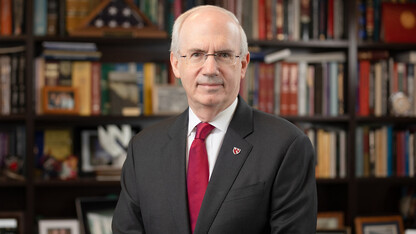· 15 min read
Full statement from Journey co-leaders

Editor's Note — This is the full statement from the co-leaders of the University of Nebraska–Lincoln's Journey for Anti-Racism and Racial Equity.
August 2, 2021
“A nation is not conquered until the hearts of its women are on the ground. Then it is finished; no matter how brave its warriors or how strong their weapons.”
~ Cheyenne Proverb
Regent Pillen’s Resolution is Divisive and Un-American
Over the past few weeks, our state has been embroiled in a discussion surrounding Critical Race Theory (CRT), prompted by a nation-wide series of initiatives orchestrated by various forces to discredit and silence any legitimate educational consideration of Critical Race Theory and by extension any effort to honestly examine the history and presence of racism in America. Here at UNL, this effort has been prompted by a proposed resolution authored by gubernatorial candidate, Jim Pillen, a long-standing Regent on the Board of Regents of the University of Nebraska. This effort has been publicly supported by the current Governor of the state and other forces. We are deeply concerned that the proposed resolution and the insistence that it be put up for a vote by the Board of Regents constitutes a serious attack on academic freedom and represents a thinly veiled challenge to the work that has been done over the years, which has accelerated in the past year, against racism and discrimination in all its forms at our institution. It is a clear warning to all who are working against racism and discrimination at our institution, and in that sense, what the proposed resolution represents demands a full critique and challenge. It is for this reason that we feel compelled to address the content of this resolution.
The authors of the proposed resolution claim an unjustified authority on what is American and what is un-American, and in so doing they build this notion on a series of fundamental fallacies and misunderstandings. The proposed resolution constitutes either a failure by its authors to take the time to be educated about what Critical Race Theory is or a decision to build a case on the rhetorical gesture of creating a false narrative as a Trojan horse concealing what is essentially a cynical effort to suppress the truly American act of examining itself, testing the truth of its core values and aspirations, and ensuring that with affirmation, bold humble self-assessment and necessary amendment and change, bettering and perfecting itself as a nation, as a people.
This proposed resolution hinders that progress. It presents an America that is afraid of itself, that considers itself too weak to handle truth, too weak to handle the challenge of contending with its own history and present. The America this proposed resolution describes is an America that blinds itself to who it might really be, and that seeks to silence those who, out of love, hope and genuine belief, seek to make the nation a better and nobler home for all its people.
We believe that the proposed resolution’s clear position that we should ban anything that is divisive in America is disingenuous because it willfully employs knowingly divisive, damaging, and abusive misrepresentations to make the claim that it is fighting divisiveness. Indeed, this resolution is divisive, and appallingly so.
In what follows, we exercise our academic freedom to critique the proposed resolution and to offer an effective rationale for opposing it.
Doublespeak, Anti-Dialogue, and Disingenuity
[Whereas the campus and facilities of a university are places for open reflection, discussion, study, research, and learning; and…]
That the proposed resolution begins with this truthful declaration, makes us hopeful that the rest of what will be proposed is consistent with this clause. Sadly, what follows is the very opposite. What follows is a direct assault on these very things. By the end of the proposed resolution, it is clear that this is a call for “the campus and facilities” of this university to be places of restricted reflection, no discussion, proscribed and limited study, blunted research and rigidly enforced learning.
[Whereas America is the best country in the world and anyone can achieve the American Dream here; and…]
Framing this resolution as if it is somehow part of a referendum on patriotism or even the idea of the American dream is rhetorically devious, and intentionally establishes the false premise that any challenge of the proposed resolution amounts to a challenge of America being “the best country” in the world. One imagines that the authors know better and know that the two ideas have nothing to do with each other. The proposed resolution does not offer a definition of the “American Dream” because it appreciates that to do so would be to beg the question. The original idea of the American Dream emerges out of healthy debate, dialogue, and bold willingness to test ideas. Indeed, there is a long and healthy historical record of the progressive effort by Americans to ensure that its “Dream” is available to all its people. To do so, it has been a necessary act to test that dream. The proposed resolution is seeking to silence such inquiry. In other words, the proposed resolution is acting in a manner that is the antithesis of the “American Dream”, making it profoundly un-American.
[Whereas education, free speech, and sound learning are the keys to freedom and opportunity in this country; and…]
It is clear that the very heart of this resolution is an assault on these very “keys” that the proposed resolution rightly lauds as the marks of “freedom in this country”. This resolution seeks to curtail the practice of education that has been protected by the hard-fought principles of academic freedom; it seeks to silence free speech, and the very clear lack of intellectual integrity that has characterized this resolution constitutes the very opposite of the principles of “sound learning”. This resolution amounts to an attack on “freedom and opportunity in this country”, and it must be seen for what it is.
[Whereas we oppose discrimination in any form; and…]
The very pretext of silencing research, thought and the exploration of ideas especially that which challenges things abhorred in America amounts to discrimination, makes this clause disingenuous and cynical.
[Whereas Critical Race Theory does not promote inclusive and honest dialogue and education on campus; and…]
There is no basis for this clause even given the most critical assessment of Critical Race Theory. By virtue of being a “theory” there is built into it the quest for discussion, for questioning, for inclusive and honest dialogue. Ironically, and tellingly, the very act of banning the dialogue that Critical Race Theory demands is indeed the promotion of silencing and repression. The proposed resolution is doing exactly what it claims to oppose. Let’s keep in mind what the Merriam-Webster dictionary lays out as a definition of the word “theory”: “A supposition or a system of ideas intended to explain something, especially one based on general principles independent of the thing to be explained.” A theory is defined by an intention to explain, not the explanation itself, nor the declaration of a final truth.
Americans can sustain the process of thought and dialogue and debate around all kinds of theories. Academic learning is constantly framed by the testing of theories. Do the authors of the proposed resolution want to curtail such thought because of their unarticulated fears and anxieties? Or, more sinister, do they seek to manipulate the fears and anxieties of others? Whatever their motivation or stated intent, the impact of this proposed resolution will be the silencing and censure of inclusive and honest dialogue.
[Whereas Critical Race Theory proponents seek to silence opposing views and disparage important American ideals;...]
This proposed resolution pretends that a scholarly idea and not people, whether they are politicians, scholars or thinkers, regardless of their beliefs and ideas, are those that will silence opposing views and disparage what the proposed resolution calls “American ideals”. This resolution is, in fact, seeking to “silence opposing views and disparage American ideals”. Indeed, while CRT and other theories of thought encourage dialogue and consideration, the proposed resolution calls for an end to dialogue and seeks to silence discussion and debate. This is the obscenity of this proposed resolution, and it should be challenged and resisted. This resolution is un-American.
[Be it resolved that the Regents of the University of Nebraska oppose any imposition of Critical Race Theory in curriculum.]
By proposing this action, the proposed resolution asks the Regents of the University of Nebraska to go against its fundamental ideals and principles as an institution of higher learning committed to intellectual integrity and ethics. The damage is significant. It is designed to create an atmosphere of fear, of oppression and of deep surveillance of the very things that we do as an institution. It is also, by extension, a crude manner of using the very language of liberation, the language that people of color have had to fight hard to bring into the spirit and heart of this nation, a commitment to diversity, equality and genuine freedom, to reinstate repressive practices. The proposed resolution, is, in effect, proposing that when victims of racism and those who proport to support them speak out about racism, they should be branded as racist and, in the process, silenced in the so-called interest of diversity and anti-discrimination.
In a word, this proposed resolution is dishonorable, and for that, it is shameful and disappointing that it is coming from where it comes. We encourage and demand the free exchange of theories and opinions and we welcome an opportunity to engage such theories in the safe and bracing space of an academic institution. But this proposed resolution seeks to do otherwise. The authors want to present their theories as the only acceptable ones and to silence the process of engaging thought. This is dishonorable.
We believe that there are many who would like to engage in a fuller understanding of what Critical Race Theory is and what it is not. We know, by their own words, that this proposed resolution has not demonstrated a clear understanding of Critical Race Theory. We offer below a basic explanation of Critical Race Theory and a critique of the implications of this attack on our academic freedom and our work against systemic racism. We are aware that it is impossible for a short statement to summarize adequately an academic theory that has existed for decades and that has its antecedents in the very core of American freedoms and the struggles for equity and justice for all Americans. But we trust that this primer will engender greater understanding of the theory and encourage further study.
Critical Race Theory: Some Basics
The development of Critical Race Theory is largely and more accurately attributed to a group of legal scholars and researchers who recognized the need to examine laws and legal interpretations that have resulted from systemic practices and express an intention to discriminate on the basis of race or have had the effect of disparate treatment on the basis of race. CRT is more an academic or intellectual approach than a set of abstract theoretical principles. It is a long-standing academic framework that has been used across various disciplines to examine issues of racial inequity and suggest solutions to achieve racial justice. As an academic theory, it provides powerful tools to analyze law, policy, texts, and data through a historical lens that centers race and racism, particularly as it is manifested systemically and structurally. More broadly, as an academic framework and intellectual movement, CRT is complex, nuanced, and can easily be misinterpreted by those who have not done a sincere study of it. CRT is not about the establishment of guilt; it is a basis for education grounded in critical thinking.
Additionally, as a theoretical approach, it just represents one way of understanding racial inequity in the US—not all scholarship on race, racism, ethnicity, and/or whiteness utilizes CRT. Race scholars working in various fields (e.g., law, sociology, literature, history, education, etc.) work from different theories and perspectives as they seek to understand racial inequity and the ways to achieve racial justice in our country. CRT recognizes that this is one of many theories, such as Law and Economics, that should be examined in the study of law. Also, CRT has been expanded to include, along with the examinations of the treatment of Blacks/African-Americans under the law, such theories as LatCrit and TribalCrit. CRT shares with these theories the view that law and its application are not always neutral. This is illuminated with the examination of the historical creation and contemporary application of laws. CRT can also be associated with similar theories such as Feminist Jurisprudence or Critical Feminist Theory which examine the effect of laws and practice on women.
Some recent calls for banning of CRT have resulted from the confusion caused by its association with an earlier movement more commonly referred to as “Critical Legal Studies,” which took a class-based approach to analyzing the law. The recent calls for banning CRT are broad and far reaching in their absurdity. A simple, but significant example of this is the manner in which the calls effectively prohibit any references to race or racism by declaring such reference divisive and “un-American”. The reason CRT is receiving so much attention in Nebraska and at UNL today is because of the deliberate work of politicians to misrepresent CRT as a label that would act as a “perfect villain[1]” in a contemporary cultural war against racial progress. By using a label that has actual meaning in race scholarship but misappropriating it to mean anything that has to do with race or racism, a deliberate and politically constructed divide has been built that is grounded in distortions and misunderstandings.
The Impact of a Dangerous Resolution
A politically constructed cultural war intending to hamper progress in dismantling racism that is grounded in distortions and misunderstandings should not be allowed the power to limit our freedom to discuss, examine, and disrupt issues around race and racism in an intellectual community like the University of Nebraska-Lincoln. Not only have we, as a campus community, committed to an anti-racism journey, we have also identified anti-racism and racial equity as a grand challenge that our community will work on through research and creative activities with dedicated purpose over the next several years. This resolution seeks to diminish these efforts and commitments by making faculty, students, and staff who do the important work of anti-racism targets in a politically constructed battle.
The work for racial justice that has already started on our campus and needs to continue has far-reaching impact across the campus and specifically in public-facing areas like our athletic department. In recent years, an increasing number of athletes have called attention to racial inequities. For example, Husker football players Michael Rose-Ivey, DaiShon Neal, and Mohamed Barry took the knee[2] during the Fall of 2016, and during the Spring of 2018, the Husker Men's Basketball team launched the "Hate Will Never Win" t-shirts and rally[3]. Two years ago, Husker cross country runner Sadio Fenner helped to create the Minority Student Athlete Collective[4]. Most recently, along with Fenner, 500 NU athletes have signed a petition opposing this proposed resolution[5]. The authors of the proposed resolution and those who have encouraged its introduction into the life of the university are on the road to increasing racial inequities that will make it more difficult to recruit both athletes of color and white athletes who seek a university home that openly embraces and promotes diversity, inclusion, and equity. While the proposed resolution effectively seeks to discourage and undermine anti-racism initiatives at UNL, other Big 10 institutions like the University of Maryland-College Park have aired “End Racism” PSA’s during the 2020 homecoming football game[6].
The proposed resolution is designed to hinder our efforts on campus to do anti-racism work in every aspect of campus life including in classrooms, in our research, in athletic recruiting, and residential living. The negative impact of this resolution and the proposition of such are expansive, leaving many members of the UNL community feeling attacked, vulnerable, and uncertain about what will happen to them if they do the important work they seek to do at UNL. With the current anti-CRT movement emboldening white supremacist groups like the KKK, and with defenders of CRT receiving death threats and extreme attacks[7], the authors may have unwittingly invited those undemocratic and hateful actions into the lives of members of the UNL community, based on misinformation, distortions, and fallacies. The protections that some UNL community members have through tenure are insufficient to guard against hateful threats of violence targeted at those doing work that intersects with race and racial issues in America, as well as those who are doing anti-racism work on our campus. Further, the members of the UNL community who are not protected by tenure and/or are people of color, face vulnerabilities as a result of the very effort to advance this resolution for a vote by the Board of Regents. Therefore, we call on the leaders of this institution to strengthen and confirm the protections that faculty, staff, and students have to do the important work necessary for our anti-racism journey and in the work of our grand challenge around anti-racism and racial justice. We call on all institutional leaders to reassert their commitment to the anti-racism journey and do the important work necessary to amplify and grow it in important and meaningful ways. We further call on our institution to continue to protect the right of our community to engage CRT as an academic theory.
It is the cardinal virtue of Love that reaches out to offer balm and soothe the pain inflicted by arrows being flung. It is love that reminds us how we live in relationship to one another, our families, relatives, tribal nations, transnational guests, friends, four-legged, colleagues and our inter-dependence to the land. It is indeed LOVE that centers honor. Love is honor.
For those who are interested in learning more about the academic foundation of CRT, a non-exhaustive list of resources is provided below.
Academic CRT Resources for Further Learning:
- Bell, D. A. (1995). “Who’s Afraid of Critical Race Theory.” U. Ill. L. Rev. 893.
- Crenshaw, K., Gotanda, N., Peller, G. & Thomas, K. (1995). Critical race theory: The key writings that formed the movement. New York, NY: The New Press.
- Delgado, R. & Stefancic, J. (2021). Critical race theory: An introduction (3rd Edition). NYU Press.
- Dixson, A. & Rousseau, C. K. (2006). Critical race theory in education: All God’s children got a song. Routledge.
- Lynn, M. & Dixson, A. D. (2013). Handbook of critical race theory in education. Routledge.
- MacKinnon, C. A. (2005). Women's Lives, Men's Laws. Cambridge, MA: Harvard University Press.
- Matsuda, M., Lawrence, C., Delgado, R, & Crenshaw, K. W. (1993). Words that wound: Critical race theory, assaultive speech and the first amendment. Boulder, CO: Westview Press.
- Taylor, E., Gillborn, D., & Ladson-Billings, G. (2015). Foundations of critical race theory in education (2nd Edition). Routledge.
UNL Journey Co-Leaders
Lory J. Dance
Associate Professor
Sociology and Ethnic Studies
Kwame Dawes
Chancellor’s Professor of English
Glenna Luschei Editor of Prairie Schnoor
Anna W. Shavers
Cline Williams Professor of Citizenship Law
Associate Dean for Diversity and Inclusion
College of Law
Kara Mitchell Viesca
Associate Professor
Teaching, Learning, and Teacher Education
Sergio C. Wals
Associate Professor
Political Science and Ethnic Studies
Colette Yellow Robe
Member of the Northern Cheyenne Tribe
Academic Retention Specialist for TRIO Programs







